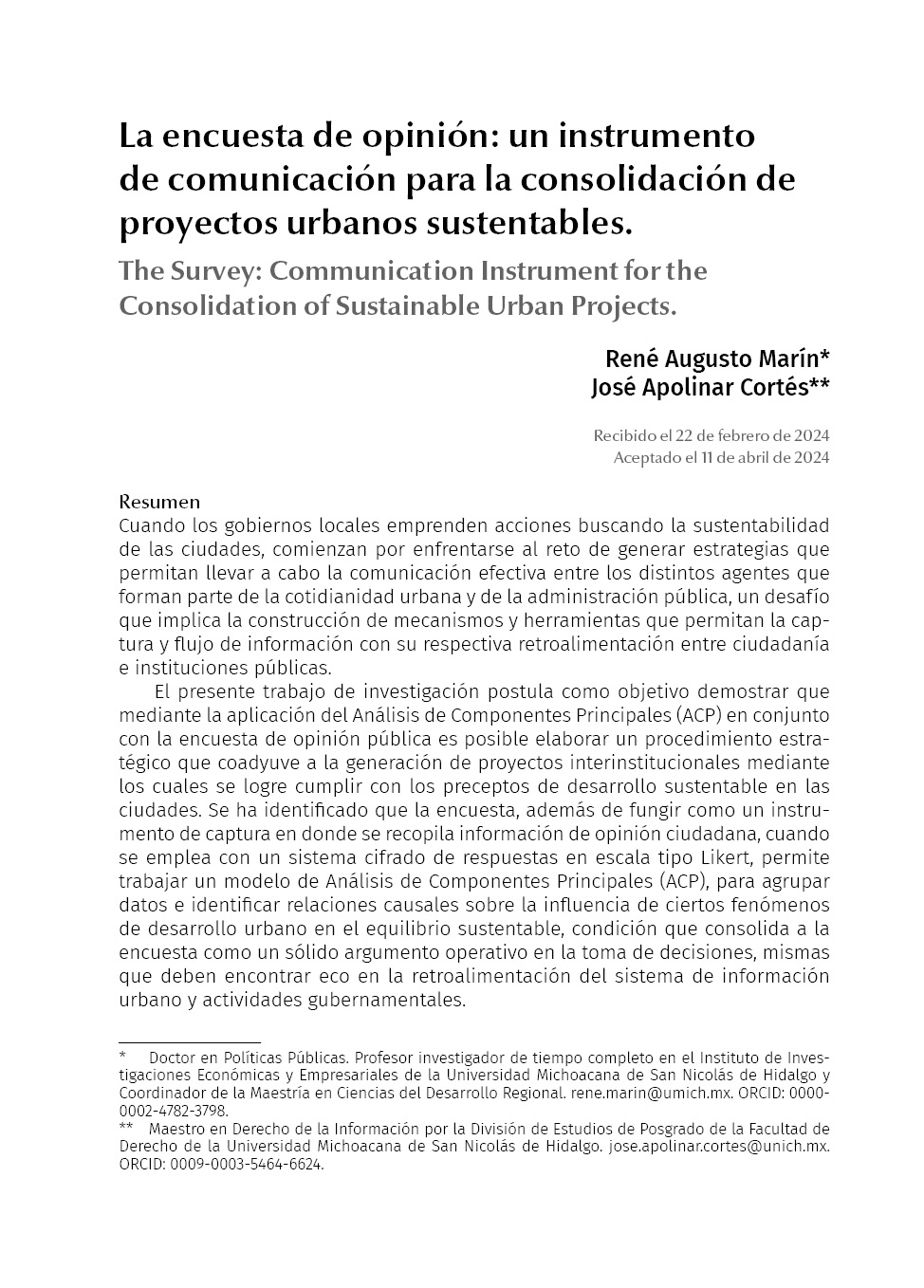The Survey: Communication Instrument for the Consolidation of Sustainable Urban Projects
Main Article Content
Abstract
When local governments undertake actions seeking the sustainability of cities, they begin by facing the challenge of generating strategies that allow effective communication between the different agents that are part of daily urban life and public administration, a challenge that implies construction of mechanisms and tools that allow the capture and flow of information with its respective feedback between citizens and public institutions.
The objective of this research work is to distinguish the survey as a transcendental tool for the formulation and design of strategies for the implementation of public policies that contribute to the sustainability of cities. It has been identified that the survey, in addition to serving as a capture instrument where citizen opinion information is collected, when used with an encrypted response system on a Likert-type scale, it is possible to work on a Principal Component Analysis (PCA) model. ), to group data and identify causal relationships on the influence of certain urban development phenomena on sustainable balance, a condition that consolidates the survey as a solid operational argument in decision making, which must find an echo in the feedback of the system of urban information and government activities.
The experimentation was carried out in the city of Morelia, with a time frame of 2023 and using the regulatory framework -goals and indicators- of SDG 11. Sustainable cities and communities of the 2030 Agenda. A survey was implemented where citizens were questioned. on the phenomena that occur in the city and indirectly it was postulated that, at the same time, this system of responses qualifies the performance of government agencies, a condition that allows, based on the results of ACP, to develop an operational strategy to combine efforts. between certain institutions and execute joint actions to seek the sustainable balance of the city.
Article Details
Citas en Dimensions Service
References
Acioly, C., Vignol, R. y Jonsson, A. (2020). La Nueva Agenda Urbana en español. ONU Hábitat. https://unhabitat.org/sites/default/files/2021/10/nueva-agenda-urbana-ilustrada.pdf
Agüero, I. (s/f). Crítica y desmitificación de los ODS. Centro de estudios estratégicos de relaciones internacionales. https://www.ceeriglobal.org/critica-y-desmitificacion-de-los-ods/
Arboit, M. E. y Maglione, D. S. (2022). Análisis de componentes principales de la morfología urbano edilicia del Área Metropolitana de Mendoza, Argentina. Urbano, 25(46), 106–121. https://doi.org/10.22320/07183607.2022.25.46.09
Asamblea General de Naciones Unidas. (2015).Transformar nuestro mundo: la Agenda 2030 para el Desarrollo Sostenible. Organización de Naciones Unidas.
COm, G. H. (1987). Nuestro Futuro Común. Comisión de Medio Ambiente de las Naciones Unidas.
Comisión de Acción por el Clima. (s/f). Las ciudades y la contaminación contribuyen al cambio climático. Naciones Unidas. https://www.un.org/es/climatechange/climate-solutions/cities-pollution#:~:text=De%20acuerdo%20con%20ONU%2DHabitat,la%20superficie%20de%20la%20Tierra
Data México. (s/f). Morelia, Municipio de Michoacán de Ocampo. Gobierno de México. Recuperado el 30 de enero de 2024 de https://www.economia.gob.mx/datamexico/es/profile/geo/morelia
Díaz Aldret, A. (2017) Participación ciudadana en la gestión y en las políticas públicas. Gestión y política pública, 26(2), 341-379. http://www.scielo.org.mx/scielo.php?script=sci_arttext&pid=S1405-10792017000200341&lng=es&tlng=es
Giandomenico, M. (1997). Evidencia, argumentación y persuasión en la formulación de políticas. Fondo de Cultura Económica.
Guillen, A., Badii, M., Blanco, M. y Sáenz, K. (2008). La participación ciudadana en el contexto de desarrollo sustentable. Revista de Innovaciones de Negocios, 5(9), 131–146. https://doi.org/10.29105/rinn5.9-9
Hunneeus, C. (1999). Las encuestas de opinión pública en las nuevas democracias de América Latina. Algunas observaciones. Centro de Estudios de la Realidad Contemporánea.
Kuschick Ramos, M. (2022). El uso de las encuestas de opinión para evaluar la administración pública. Revista Gestión Y Estrategia, (19), 19-26. https://doi.org/10.24275/uam/azc/dcsh/gye/2001n19/Kuschick
Martín-Baró, I. (2021). La encuesta de opinión pública como instrumento desideologizador. Revista Mexicana De Opinión Pública, (30), 161–171. https://www.revistas.unam.mx/index.php/rmop/article/view/77479
Mora, M. (5 de junio de 2023). Descubre el poder del análisis de componentes: Pasos y recomendaciones para dominar esta técnica de análisis de datos. LinkedIn. https://www.linkedin.com/pulse/descubre-el-poder-del-an%C3%A1lisis-de-componentes-pasos-y-mora-caballero/?originalSubdomain=es
Ortega, C. (s/f). Encuestas de opinión, qué son y cuándo utilizarlas. Question Pro. https://www.questionpro.com/blog/es/encuestas-de-opinion/
Help Center XLSTAT. (s/f). Análisis de Componentes Principales en Excel. XLSTAT. https://help.xlstat.com/es/6776-analisis-de-componentes-principales-en-excel
Team Roomi. (25 de noviembre de 2020). ¿Estás en la edad ideal para independizarte?. Roomi. https://blog2.roomiapp.com/mexico/estas-en-la-edad-ideal-para-independizarte/
Villareal, M. (s/f). Participación ciudadana y políticas públicas. Instituto Estatal Electoral y de Participación Ciudadana de Nuevo León. https://portalanterior.ieepcnl.mx/educacion/certamen_ensayo/decimo/MariaTeresaVillarrealMartinez.pdf

Revista Mexicana de Opinión Pública por Universidad Nacional Autónoma de México se distribuye bajo una Licencia Creative Commons Atribución-NoComercial-SinDerivar 4.0 Internacional.
Basada en una obra en http://revistas.unam.mx/index.php/rmop.
